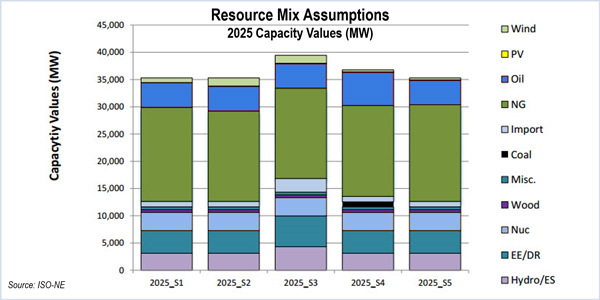By William Opalka
WESTBOROUGH, Mass. — ISO-NE last week presented the five scenarios it will evaluate in its 2016 Economic Study, which envisions continued reliance on natural gas, renewables, energy efficiency and demand response.
The RTO is in the early stages of Phase I of the two-phase study, which will look at projected needs for 2025 and 2030.
The draft study will analyze the following futures:
- The generation fleet meets existing renewable portfolio standards, with natural gas combined cycle units replacing any retiring units and filling any installed capacity requirement shortfalls.
- The same as Scenario 1 except that all additional capacity needs, including retirements, are met with new renewable/clean energy resources, including nuclear power.
- The “RPS-plus scenario” assumes additional renewable/clean energy resources above existing RPS requirements.
- The “no retirement scenario” is the same as Scenario 1, except that RPS requirements are met by renewable/clean energy resources that are interconnected to the system, under construction or approved as of April 1, 2016, with alternative compliance payments — which would support renewable energy projects — used to meet any remaining RPS requirements. Combined cycle plants meet any installed capacity shortfalls.
- The same as Scenario 4, except that retired units are replaced with combined cycle plants to meet installed capacity requirements.
Most of the scenarios reflect the region’s commitment to renewable generation and its shift away from coal and oil. “We see little to no generation from oil-fired units,” Michael Henderson, ISO-NE director of regional planning and coordination, told the Planning Advisory Committee on Wednesday.
In Scenarios 1, 4 and 5, fossil-steam resources burn oil, coal and natural gas at existing locations. Scenarios 2 and 3 have very large amounts of zero-dispatch-cost resources such as wind, energy efficiency and solar photovoltaic. And while Scenario 3 adds new import capability, energy imports are about the same as the other scenarios for 2030 because of the large-scale addition of zero-cost resources.
That is especially pertinent following Massachusetts’ approval of legislation requiring the procurement of large amounts of Canadian hydropower and offshore wind. (See Massachusetts Bill Boosts Offshore Wind, Canadian Hydro.)
Phase I will consist of traditional economic study analyses, with an emphasis on production costs.
Phase II will supplement Phase I by discussing several market and operational issues, including Forward Capacity Auction clearing prices, intra-hour ramping, regulation and reserve requirements and access to natural gas.
A draft report is expected to be completed in the fourth quarter.




